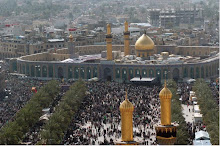Kerbala was born on a tragic Monday, in 680 AD. The declining sun was casting lengthening shadows on the desert of Kerbala. Husain (A) was alone with none to befriend him, none to help him, and none to defend him[3]. On the other side was an army of several thousand strong, thirsting for his blood (SDOL). The soldiers of Umr Saad saw Husain (A) coming towards them, clad in the Prophet’s turban and robe. Husain (A) gave a speech in a clear and ringing voice. He reminded them that he was the grandson of Prophet Mohammad (p.b.u.h.), whom they acknowledged as their Prophet of Islam. He asked them why they had mercilessly killed his sons, brothers, and faithful friends; why have they denied him and his family even food and water? Umr Saad, Commander of Yazid’s army, replied saying: “Husain, we have heard enough from you. Since you are not accepting Yazid as your spiritual Lord, and subject yourself to his rulings in all matters, you will be beheaded, say what you will.” Shortly after, Umr Saad gave orders to fire a volley of arrows at Husain (A). He also gave orders to his infantry and cavalry to converge on Husain (A) with swords, scimitars, and daggers. Husain (A), with sword in hand, charged on the attacking soldiers mowing down all who came within the range of his sword. He then turned like lightning[4] to the center of the army, and cowardly soldiers retreated in panic and confusion. The army that had tried to converge on Husain (A) was now scattered and in full retreat. Husain (A) halted his charge to offer the evening prayer; he could use the respite to offer it, since the soldiers had fallen back. Umr Saad, who was watching Husain (A) from a distance, ordered his archers to fire volley after volley of arrows, his infantry to throw stones, and other soldiers to catapult burning coals at him from a distance. Husain (A), who was already wounded from head to foot, was now receiving one mortal wound after another in quick succession. His blood was flowing so fast that he was finding it difficult to remain on the horseback. Husain (A) managed to slide down from the saddle to the burning ground beneath; but for a few moments his body remained suspended on the spikes of the arrows that had pierced his body from top to toe. He saw the sun despite his stallion trying in vain to protect him from its blazing rays. He prostrated his head in prayer and addressed the Maker: “My Lord and Lord of the universe, I submit unreservedly to Thy decree and resign myself to Thy dispensation.” [5]
Umr Saad called upon his warriors to cut off Husain’s (A) head. Shimr decided to hurry up with the most dastardly act. He mounted on Husain’s (A) back with the sword he was carrying, and he prepared himself to cut off Husain’s (A) head. Husain (A), who was too weak with the loss of blood to raise his head, turned a little and said in a faltering voice, which was audible to Shimr: “O Shimr, I am thirsty, I am thirsty O shimr, give me a few drops of water before you accomplish your task.”[5]
Zainab (A), who was watching the events from the camps rushed to the tent where her nephew, Zainulabdeen (A), was lying on his sick bed. She shook him up and told him what she had seen a moment earlier. Supporting him, she brought him to the exit of the tent. Both of them stood there silent and speechless. In the distant and dusty view, they saw a spear with Husain’s (A) head on it. They heard the drums of Yazid’s army proclaiming the end of the battle. Zainab (A) with a shriek wailed: “O my brother Husain, my brother Husain! At last they have killed you, they have beheaded you without a drop of water,” and she fell unconscious unto her nephew. Zainulabdeen’s (A) gently put her down on the floor, and prostrating his head on the ground, exclaimed: “O God, we mortals resign ourselves to Thy will. From Thee we have come and unto Thee shall be our return.”[5]
Husain (A) stood for the oppressed and weak against Yazid, who was known as a debauchee and a profligate to even his own supporters. Husain (A) tolerated torture mental and material, and relinquished his wealth and loved ones; nonetheless, he never turned from the just principles for even a second. Kerbala shows faith, courage, and tolerance in especially the most difficult hours of trial.
[1] (p.b.u.h.) stands for Peace be upon him, is put with the names of holy prophets and entities.
[2] (A) stands for Allayhay Salaam, Arabic for Peace be upon him, is put with the names of holy entities.
[3] Tautote sentence style.
[4] Simile
[5] Zakir. Tears and Tributes. Clarksville, Maryland: Khatoons, 2006.
[2] (A) stands for Allayhay Salaam, Arabic for Peace be upon him, is put with the names of holy entities.
[3] Tautote sentence style.
[4] Simile
[5] Zakir. Tears and Tributes. Clarksville, Maryland: Khatoons, 2006.
- Wikipedia. “Battle of Kerbala.” 8 March 2007. 19 March 2007
- SDOL. “Kerbala.” 7 Mar. 2007. 2003-2008





No comments:
Post a Comment